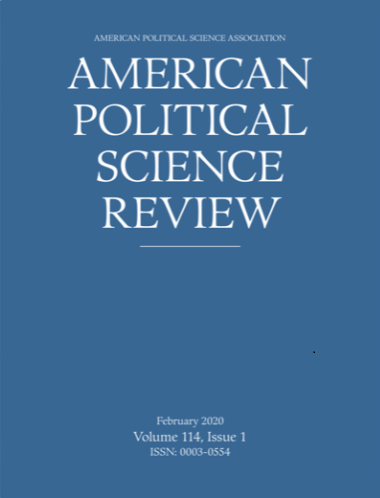一种基于群的偏振测量方法
IF 5.9
1区 社会学
Q1 POLITICAL SCIENCE
引用次数: 0
摘要
尽管两极分化在社会科学中越来越重要,但其定量测量滞后于其概念发展。政治和社会两极分化是一种以群体为基础的现象,其特征是群体间异质性和群体内部同质性,但现有的措施只能捕捉到这些特征中的一个,或者难以在不同情况下或不同时间内进行比较。为了使极化的概念和测量更接近一致,我引入了集群极化系数(CPC),这是一种多模态的度量,允许学者纳入多个变量,并在不同数量的政党或社会群体的背景下进行比较。对精英和大众两极分化的三个应用表明,中国共产党的结果实质上是合理的,一个开源软件包实现了这一措施。本文章由计算机程序翻译,如有差异,请以英文原文为准。
A Group-Based Approach to Measuring Polarization
Despite polarization’s growing importance in social science, its quantitative measurement has lagged behind its conceptual development. Political and social polarization are group-based phenomena characterized by intergroup heterogeneity and intragroup homogeneity, but existing measures capture only one of these features or make it difficult to compare across cases or over time. To bring the concept and measurement of polarization into closer alignment, I introduce the cluster-polarization coefficient (CPC), a measure of multimodality that allows scholars to incorporate multiple variables and compare across contexts with varying numbers of parties or social groups. Three applications to elite and mass polarization demonstrate that the CPC returns substantively sensible results, and an open-source software package implements the measure.
求助全文
通过发布文献求助,成功后即可免费获取论文全文。
去求助
来源期刊

American Political Science Review
POLITICAL SCIENCE-
CiteScore
9.80
自引率
5.90%
发文量
119
期刊介绍:
American Political Science Review is political science''s premier scholarly research journal, providing peer-reviewed articles and review essays from subfields throughout the discipline. Areas covered include political theory, American politics, public policy, public administration, comparative politics, and international relations. APSR has published continuously since 1906. American Political Science Review is sold ONLY as part of a joint subscription with Perspectives on Politics and PS: Political Science & Politics.
 求助内容:
求助内容: 应助结果提醒方式:
应助结果提醒方式:


